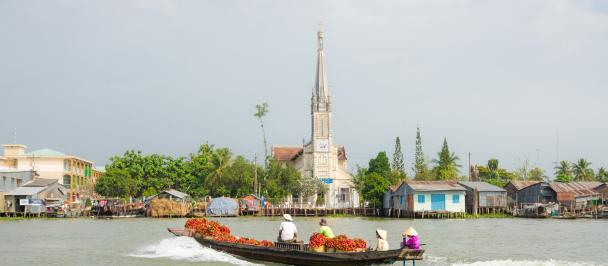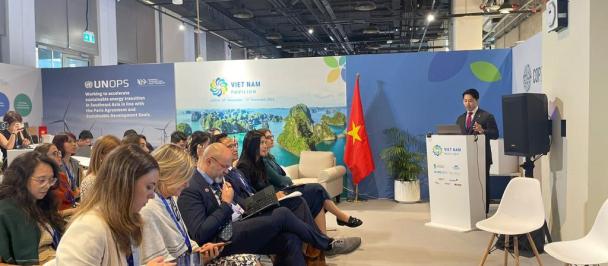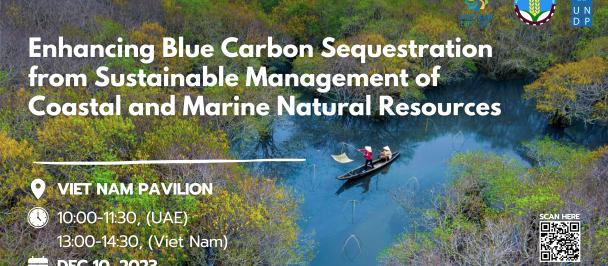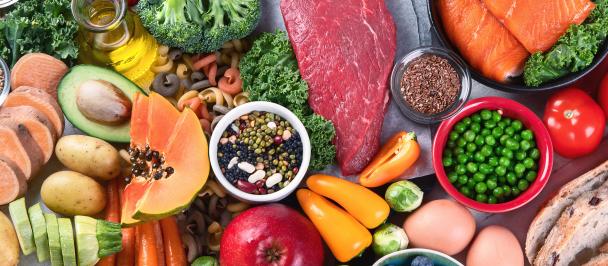Written by Merran Eby, UNDP Viet Nam
Digitalization finds fertile soil in the eco-friendly dragon fruit farms of Binh Thuan
January 28, 2024
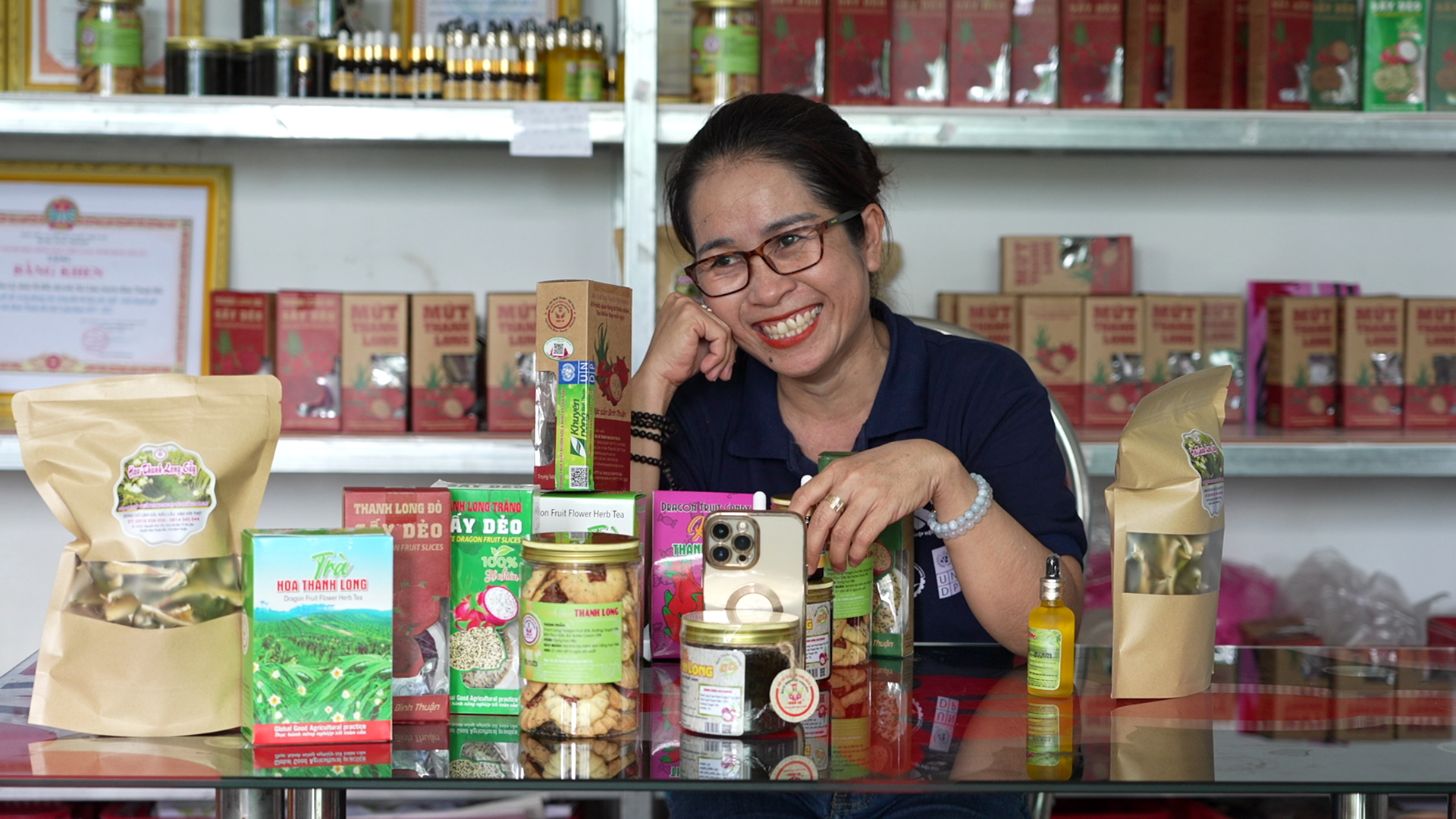
Huong is livestreaming to sell the products
Nguyen Hoang Thu Huong is clearly a woman comfortable in front of the camera. Lively, good-humoured, and expressive, with a keen eye and an easy natural charm, we find her streaming live from her smartphone in the cramped back room of a sweet-smelling warehouse.
The focus of Huong’s Facebook discourse is arrayed across the desk in front of her: dragon fruit everything. She picks up her products one by one to show off the sleek packaging, and expounds on the delicious taste, the beautiful colour, the skincare benefits, the positive environmental impact. She’s evidently done this many times, and has no difficulty whatsoever keeping up a constant and animated flow of chatter with her audience.
Huong, however, is not just any charismatic livestream hostess: she’s the deputy director of the Hoa Le Dragon Fruit Cooperative, one of several groups of forward-thinking producers who have recently been upending the traditional approach to dragon fruit farming in Binh Thuan by leaping into the world of online commerce, thanks to a joint project implemented by UNDP Viet Nam and the Binh Thuan Agricultural Extension Office.
Using data for sustainability
Viet Nam’s dragon fruit industry has been under considerable pressure in recent years. The country’s reigning agricultural export until only recently, it suffered a series of setbacks including the COVID-19 pandemic, disastrous droughts in 2020, and creeping competition from emerging producers like India and Mexico, which taken together have threatened many domestic Vietnamese farmers with a potentially existential crisis unless they can learn to adapt.
Recognizing this, in 2019 UNDP Viet Nam teamed up with the government in Binh Thuan to work on greening the entire provincial supply chain for dragon fruit ‘from farm to table.’ Part of the project’s work has been direct practical support to procure up-to-date farming equipment, such as subsidizing more efficient lighting and irrigation systems. Just as importantly, however, it has provided Huong and others like her with training on digital literacy to help them navigate the unfamiliar online world.
Some training they received was aimed at building practical e-commerce skills like website design, online shopping platforms, marketing (including livestreaming), and customer relations. Other workshops focused on the realities of being a farmer in a time when being demonstrably eco-friendly is increasingly a requirement for desirable but strictly regulated markets such as Europe or Japan. Participants were introduced to the concept of green agriculture and various efficient, cost-effective, and sustainable techniques, and were also taught how to calculate and upload their farms’ carbon footprints to a database using a mobile app, taking into consideration everything from energy consumption to pest control to waste management.
As a result, the project has supported several farmers from the cooperative to successfully reach GLOBALG.A.P. certification – the most widely recognized international scheme for good agricultural practices – and successfully introduced an electronic traceability system that allows consumers to digitally track the origin and carbon footprint of every single Hoa Le dragon fruit in real time by scanning a QR code.
‘Rejected fruit’ finds a tasty, green new use
In addition to being among the earliest adopters of carbon traceability for fruit in Viet Nam, Huong and her colleagues are finding other ways to take advantage of their new knowledge.
Historically, almost all of Viet Nam’s dragon fruit has been exported fresh, packed carefully into crates bound for the produce section of supermarkets around the world. Consumers have come to expect ‘perfect’ fruit, however, meaning that anything scuffed, scratched, or oddly shaped is deemed unsuitable for sale. Hoa Le Cooperative used to simply throw these ‘flawed’ fruits away, something that never sat entirely well with Huong. While she nurtured the hope of developing alternative products for years, however, her cooperative initially lacked the skills or equipment to make them a reality.
When they joined the green agriculture project and committed to meeting GLOBALG.A.P. standards for minimizing waste, everything changed.
“When adhering to GLOBALG.A.P. standards in dragon fruit cultivation,” Huong tells us, “we use everything: the flower, the fruit, the seeds, and even the peel.”
Paired with her new skills in online marketing, it seemed to Huong like the perfect opportunity to act on her plan, and she began to experiment.
With project support, the cooperative purchased a drying machine to help expand their product line and appeal to a wider range of customers. After Huong developed her first successful product, she was motivated to create more. As a result, Hoa Le’s line-up has become rather impressive in the past couple of years. In addition to fresh fruit, they now offer dried dragon fruit snacks, tea, candy, cookies, wine, juice, and a bright fuchsia-coloured ice cream, and they recently developed an essential oil extracted from dragon fruit’s nutrient-packed seeds.
Step by step
These days, Hoa Le Cooperative maintains online storefronts on Facebook, Shopee, and Zalo, where all of their products are now on display, and Huong herself hosts fan page livestreams on a regular basis to attract new customers using the knowledge she gained from the project. She estimates that in the three years since they started selling a wider range of dragon fruit items, their profits have already increased by 20-30%.
Huong acknowledges that it won’t all be smooth sailing ahead. It’s been a constant uphill battle to increase their visibility, and some farmers are still learning how to navigate the intricacies of data management. And while they’ve successfully set up e-traceability QR codes for their fresh fruit, they’re still working on the system for everything else. In spite of these challenges, however, she’s confident that the project has helped to set them on the right path forward.
“Following the proper procedure ensures that our customers can feel confident about the products they buy,” she says. “I believe in the necessity of following a clean process.”
Others in her community agree: the international market is increasingly favouring green products, and anyone who can adapt to meet global sustainability standards is already ahead of the curve.
These activities are deployed through the project “Accelerating Private Sector Engagement in Climate-Resilient and Low-Emission Investment Opportunities in the agricultural sector in Viet Nam’s NDC,” a part of the UNDP NDC Support Programme with generous funding from the Governments of Germany, Spain, and the European Union.

 Locations
Locations
